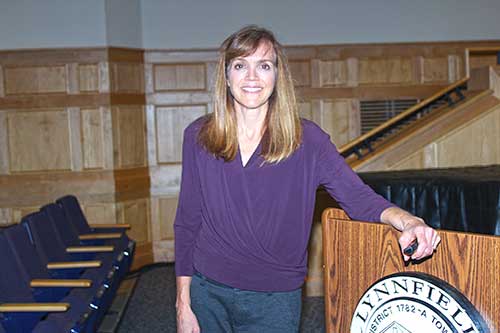Published October 31, 2018
By DAN TOMASELLO
LYNNFIELD — Anxiety is treatable when families understand how it works, psychotherapist Lynn Lyons told a large crowd during a presentation in the Lynnfield Middle School auditorium on Oct. 24.
The School Department, A Healthy Lynnfield and Lahey Health came together to sponsor Lyons’ heartfelt and humorous presentation, which featured 220 attendees that included both parents and children. Lyons is a licensed clinical social worker and psychotherapist who works in Concord, New Hampshire.
The theme of Lyons’ presentation was “How to help your anxious child.”
“The sense that most people have is anxiety is out of control and is an epidemic,” said Lyons. “That is somewhat true. The interesting thing about anxiety and kids with anxiety is that we have trouble finding the statistics about how many kids are anxious.”
Lyons said, “The research is pretty clear that anxiety runs in families.”

PSYCHOTHERAPIST LYNN LYONS gave an overview of anxiety during a community presentation on Oct. 23. (Dan Tomasello Photo)
“If you are an anxious parent, the likelihood of you creating an anxious child is pretty darn high,” said Lyons. “In fact, it’s 67 times more likely. I don’t tell parents that to make them feel guilty. It’s not about blaming parents. What it’s about is we are social creatures, and that culture and family culture is very powerful and always has been.”
Lyons said children often model their parents’ behavior.
“If you speak English, the reason why your child speaks English is because you speak English,” said Lyons. “If you speak another language, the reason why your child is bi-lingual is because you speak two languages. It’s really important to remember that what we do, how we see the world and how we convey that to our children is very powerful.”
In her practice, Lyons said she meets with parents and children simultaneously.
“Parents need information, coaching and support,” said Lyons. “They need to identify their own patterns.”
Lyons said, “The cool thing about anxiety is it’s not all that complicated.”
“This is not a new problem,” said Lyons. “This is something human beings have been dealing with forever and ever and ever. And part of the reason we have been dealing with it is we are social creatures and we have a really sophisticated prefrontal cortex. When these two things come together, we have to accept that worry is not going anywhere because we are capable of imagining things that haven’t happened yet.”
Lyons said “one of the things we know about anxiety in families is there is a genetic push in terms of temperament.”
“The temperament that puts you most at risk for developing anxiety is called a behaviorally inhibited temperament,” said Lyons. “This is a fancy way of saying you are super shy. But even if you have a behaviorally inhabited temperament, we can do things to lower your risk. It doesn’t mean we can make you the life of the party, but we can teach you and we can nurture you in a way that allows you to step forward instead of step back.”
Lyons said, “Anxiety’s pal is depression.”
“One of the top predictors for developing depression is an untreated anxiety disorder as a kid,” said Lyons. “If you are anxious and nobody does anything about it, the likelihood of you developing depression as a teenager or young adult is enormously high. People get depressed about being anxious. They don’t get anxious about being depressed. That is just the way this thing rolls.”
Lyons noted anxiety is very rigid. She encouraged parents to teach their children “how to tolerate making mistakes” and not to obsess about being a perfectionist.
“Our job is not to get in the way of them making mistakes,” said Lyons. “Our job is to teach them how to manage it when it happens.”
Lyons also said anxiety is very similar to a cult leader.
“As long as you follow the cult leader and do what the cult leader says, everything goes pretty smoothly,” said Lyons. “But what happens when you disobey the cult leader? There is a problem. The cult leader is about avoidance, certainty and comfort. This is what anxiety wants. It doesn’t matter what you are worrying about. Anxiety is looking for certainty and comfort. It’s a doubt factory.”
Lyons said uncertain situations often cause people to start worrying about things. She noted the amygdala, one of two almond-shaped clusters of nuclei located in the brain’s temporal lobes, plays a key role in processing memory, decision-making and emotional responses including anxiety.
“It’s your fight or flight alarm system,” said Lyons. “The amygdala learns from experience what is dangerous and what is not. The amygdala does not have the ability to differentiate real danger such as being chased by a grizzly bear or imagined danger such as failing a math test.”
Lyons said being anxious about things “is not always bad.”
“Sometimes when you are worried about something, it gets your butt out of the chair to do something you need to do,” said Lyons. “If you are driving to the airport before and wonder if you have your passport in your bag, you check. It’s part of being a human and we are not going to get rid of the amygdala even though several children have suggested that as a treatment action. The problem with worry and anxiety is we are firing it off all the time. We have to retrain the amygdala.”
Lyons gave an overview of four concepts she said is critical when dealing with anxiety. She said it’s important for people not to obsess about the content that causes anxiety but rather identify the process that causes it.
“If you are worried about bumblebees, we are going to have you walk by rhododendrons in the spring when bumblebees are there,” said Lyons. “If you are afraid of the water, we are going to have to get you in the water. The problem is not the content itself. It’s the process. The first critical part of the process is pulling the worry out and recognizing how it operates.”
Lyons said it’s important for parents to “eliminate nothing.” As an example, she recalled telling an adolescent she was treating how avoidance made his anxiety worse.
“I sent him on his way and he came back two weeks later,” said Lyons. “I asked him how was it going and he said ‘so much better, I haven’t had to take any of my anxiety medication since I saw you last.’ I thought that was fantastic, but he didn’t tell he was taking any anxiety medication. I asked his dad what he was taking, and he said baby aspirin. That is a placebo. Placebos work. The four things that are most effectively treated with placebos are depression, anxiety, sleep and pain. I had to tell (the son) because he doesn’t think he has any ability to manage his panic and he has been doing it the whole time.”
Lyons said parents should not constantly problem-solve for their children.
“When we keep stepping in and getting in the way of problem solving, they are not learning the skills that are not only depression prevention but anxiety prevention,” said Lyons. “When you are little, we show you the ropes in a secure, loving way. But what we hope is that you take that information and internalize so you can use it when you need it.”
Lyons said it’s important for people to “have an offense” when they are dealing with anxiety because “anxiety is all about defense.” As an example, Lyons recalled how she and her family have a history of fainting.
“Nobody treated this like a problem when I was a kid,” said Lyons. “My dad does it, my sister does it, my brother does it and I do it. My oldest son experienced it in fourth grade. We have been working on it since then. He is now 20. You know what he is thinking about doing for a living? Being a doctor. What the trick is if you faint, you faint. We are not going to back down. If it happens, it happens. And that immediately takes the power away.”
Lyons noted anxious parents often cause their children to “perceive the world as more dangerous.”
“The world can be a dangerous place and we need to equip our kids with information,” said Lyons. “A quarter to a third of kids (have) said the things they fear most are based on things they have heard adults talking about.”
Lyons said parents can use games and humor to help alleviate their children’s anxiety.
“It can give them a push in the right direction,” said Lyons.
Lyons said it’s important for parents to stress to their children that things can change and every situation is not permanent.
“There is something called positive expectancy, which is the belief that things will change,” said Lyons. “If somebody is going to heal from something whether it’s cancer or depression, the belief that things will change is essential. The message we are giving a lot of teens, not on purpose, is that this is who you are. I know they are getting this message because they tell me that all the time. I learned in health class that if you get depression when you are 15, it means you have a chemical imbalance and you will have it for the rest of your life. That is not only dangerous but wildly inaccurate.”
After Lyons concluded her presentation, she was given a round of applause.
Superintendent Jane Tremblay and Selectman Phil Crawford, who serves as A Healthy Lynnfield’s Steering Committee chairman, both thanked Teaching and Learning Director Kevin Cyr for organizing the presentation and Lahey Health for funding it.
CUTLINE
PSYCHOTHERAPIST LYNN LYONS gave an overview of anxiety during a community presentation on Oct. 23. (Dan Tomasello Photo)




